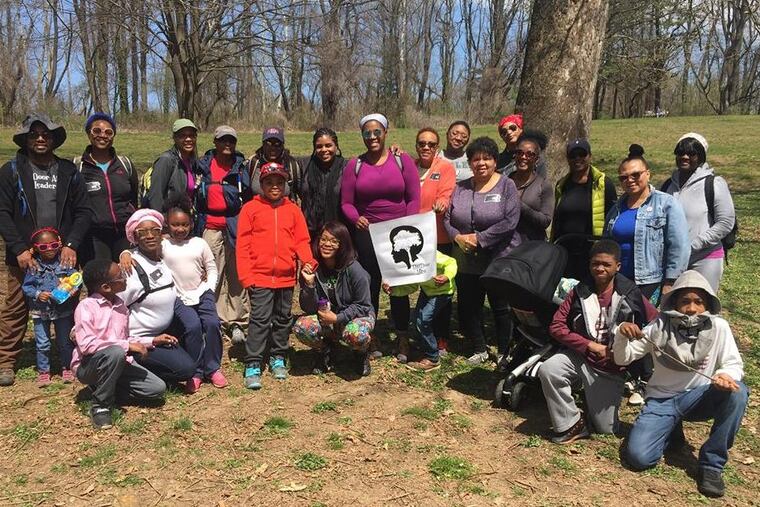‘We’re trying to make a generation shift’: Meet the groups diversifying the great outdoors
According to Campgrounds of America 2018 North American Camping Resort, the number of Asian, Hispanic and black campers has been increasing each year since 2012.

When Victoria Buitron ventured onto her first trail for a New Year's Day hike a few years ago, she said the ever-changing terrain transformed her.
The treadmills she was used to didn't stand a chance.
But Buitron, 29, noticed one aspect of the great outdoors that wasn't so great.
"I've hiked just about everywhere in the tri-state area, and it was really rare that I saw someone who looked like me," said the Connecticut native, who runs the @latinaswhohike Instagram page.
The lack of diversity in the outdoors, in the magazines and websites that cover the subject, and even in industry ads for hiking and camping gear has been slowly changing. According to the Kampgrounds of America 2018 North American Camping Report, the number of new Asian, Hispanic, and black campers has been increasing since 2012, and more and more, they're going outdoors together.
"We're not rescuing people from the 'hood and taking them to the woods to have some conversion experience," said Rue Mapp, founder of Outdoor Afro. "We're trying to make a generation shift, making sure parents are fully engaged. You have to be the one to make it happen to make a love for the outdoors last."
Mapp grew up in California and spent time hunting, fishing, and chasing livestock at a family ranch in Lake County. Nature, she said, pulled the family together there, but, like Buitron, she always noticed what statistics show: Whites made up 74 percent of the 142 million people who participated in outdoor activities, according to an Outdoor Foundation report from 2016. Non-Hispanic whites are 62 percent of the U.S. population.
"I was the only person who looked like me," Mapp said.
Mapp started Outdoor Afro in 2009 to give fellow outdoors enthusiasts a way to get outside in an organized way. Today, Outdoor Afro has groups in 26 states, including Pennsylvania, where Tarik Moore has led hikes along the Wissahickon and kayaking trips in West Philly.
"I grew up in Jersey City, and the only outdoorsy space we had was Liberty Park," said Moore, an accountant from Bucks County. "I guess I didn't become an outdoorsy person and explored until I was an adult."
When the Outdoor Foundation studied why people don't go outside, 26 percent of blacks said they thought it was too expensive. The study found 25 percent of whites and 22 percent of Hispanics agreed. Moore believes the cost of high-quality hiking and camping gear can be a detriment in poorer, inner-city neighborhoods, but every expedition, he noted, doesn't have to end atop a snowcapped mountain in $150 boots. Often, gear can be bought used or even rented.
"People might not have the means, and the cost of camping could be prohibitive, but there's parks that you can go to right in the city," he said. "When we went to the Wissahickon, people who lived just a few miles away were trying it for the first time."
Recently, Moore led an outing to the Johnson House historic site in Germantown, where participants needed only curiosity.
Mapp said she tries to educate Outdoor Afro members on the value of quality gear.
"You're investing in that experience," Mapp said. "You buy one tent one time, and that's going to last you 15 years."
The Outdoor Industry Association also noted that Hispanics tend to take more outings per year — 49 — than blacks, Asians, and even whites. Latino Outdoors, founded in 2013, now has 5,000 members nationwide, organizing group outings and promoting the myriad health benefits of nature.
"We exist to educate the community," said executive director Luis Villa.
According to the 2018 Outdoor Industry Association's participation report, fear of being hurt by other people, or even animals, ranks low across every demographic. Still, the outdoors can be a different experience for blacks and Hispanics.
Last year, writer Rahawa Haile detailed her solo Appalachian Trail hike from Georgia to Maine, both the joys of finding transcendence in the outdoors and the realities of being a black woman in nature when she headed into rural towns for a break.
"They say they don't see much of 'my kind' around here and leave the rest hanging in the air," Haile wrote.
A 2016 story about Latino Outdoors in High Country News detailed a moment when a group of hikers was stopped by Border Patrol agents southwest of Tucson, Ariz.
"We stop, are questioned by men in uniform about our citizenship status, then waved on. I cannot easily shake what feels like a profound violation," author Glenn Nelson wrote.
Villa said Latino Outdoors is trying to bridge the gap between Hispanics and park rangers.
"Some folks often have a negative impression of uniformed individuals," he said.
Love for the outdoors is often passed down from family, from new parents creating the same moments burned into memory from campfires of their youth. Moore, the Outdoor Afro leader for the Philadelphia and Harrisburg area, said he tries to bring his three children on every adventure, locking in a future where nature for them is the norm.
"It's the best thing for them," Moore said. "Black people have a connection with the outdoors, and they always did."